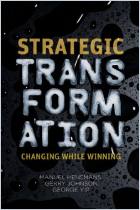
Recommendation
You may think of steel production as an old industry that doesn’t make room for innovation, but Tata Steel’s experience, outlined in this special report from the Boston Consulting Group, proves otherwise. Tata Steel saw a precipitous drop in profits in 2014, but a new change initiative implemented the following year saw the company soar to new heights. CEO T.V. Narendran and Boston Consulting Group managing director Amit Ganeriwalla tell the company’s story. It turns out that listening to the little guy can lead to massive value creation in big business.
Summary
About the Authors
T.V. Narendran is the CEO & managing director at Tata Steel. Amit Ganeriwalla is managing director and senior partner at the Boston Consulting Group’s Mumbai office, and a global leader in the materials and process industries.


















Comment on this summary or Iniciar a Discussão